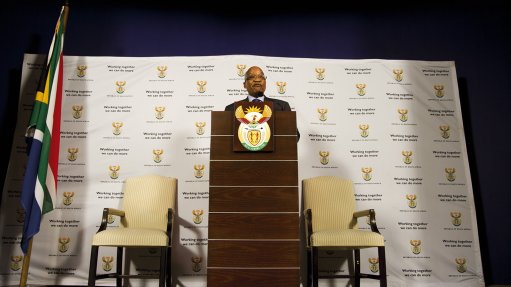
Photo by: Duane Daws
As the South African Chamber of Commerce and Industry (Sacci) calls on government to foster closer collaboration between the public and private sector to ease economic burdens, the Steel and Engineering Industries Federation of Southern Africa (Seifsa) has urged government not to add further pressure on businesses with additional taxes.
The business communities’ wishlist emerged in the run-up to President Jacob Zuma’s State of the Nation Address (SoNA) on Thursday, which was being held during what was deemed a challenging period for South Africa.
The Presidency had called for constructive suggestions on what issues Zuma should tackle during his yearly national broadcast to citizens.
The dominant issues raised included small, medium-sized and microenterprise development, education; social development; crime and drugs; corruption; housing; increasing public servants’ housing allowances; better salaries for police, teachers and mineworkers; skills development; and the mitigation of the electricity crisis.
Xenophobia, homophobia and the rise of racism, in addition to sustainable employment, the protection of rhino, land ownership, water shortages, poor health infrastructure, road deaths, littering and South Africa’s role in peacekeeping on the continent were also top concerns for South Africans.
Sacci president Vusi Khumalo believed the SoNA should provide an indication of the policy imperatives of government for the forthcoming year and address the national impediments to economic growth, job creation and poverty alleviation.
“The business community is yearning to assist government in finding solutions to several challenges that threaten economic stability,” he said in a statement on Tuesday.
Khumalo pointed out that several key challenges to economic growth required high-level attention, including the protracted electricity supply deficit, service delivery and related protests and the slow progress in the deployment of the National Development Plan, which still required considerable buy-in from stakeholders.
Meanwhile, Seifsa said it would resist any imposition of additional taxes on businesses, following speculation that Finance Minister Nhlanhla Nene could announce a tax hike in this year’s budget to close the country’s R27-billion revenue shortfall in the next two years.
Seifsa CEO Kaizer Nyatsumba said the already heavily taxed, struggling South African business community – especially in the metals and engineering sector – could not afford to pay any additional taxes to government.
“In South Africa, where economic growth is painfully slow and unemployment levels extremely high, the government would be extremely ill-advised to worsen the country’s bleeding economy by imposing additional taxes on business,” he stated.
Government should leverage other measures to stimulate the local economy, including local procurement and government tax breaks, which would create more jobs, instead of applying more taxes to existing enterprises at a time when business was “struggling for survival”.
Nyatsumba warned government to tread with caution so as not to suffocate “the goose that lays the golden egg” – the middle-class and high earners – in its efforts to generate more revenue.
“The government’s priority should be ensuring that every tax rand is used wisely, to the benefit of the country, and that it does not end up in the pockets of some selfish individuals through corruption, and raise funds through upward adjustments to the fuel levy and sin taxes, in addition to better management of public finances,” he concluded.